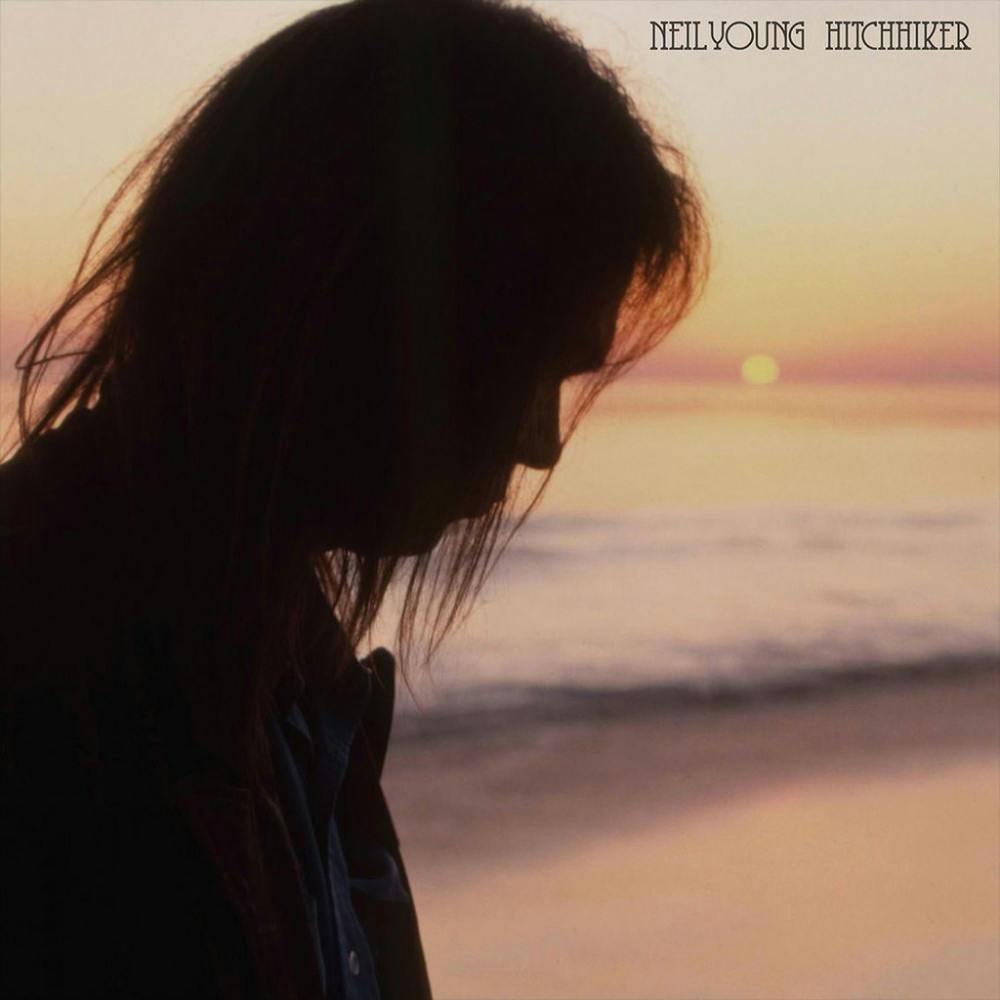Neil Young is one of rock’s most restless dependables. With an idiosyncratic career spanning over half a century, Young’s stylistic ventures have reached everything from blues and heavy noise-rock to — perhaps most bafflingly — Kraftwerk-esque synth-pop. Alongside this reliable versatility, there lies his extensive, constant stream of output. Young has released nearly a dozen studio albums in the past decade alone, and after 2016’s scattered “Peace Trail,” he has returned to his library of unreleased music — which only rivals Prince’s in its vastness — for the release of “Hitchhiker.”
Recorded in a single setting Aug. 11, 1976 during the arguable pinnacle of his career, “Hitchhiker” only features Young’s ethereal high-pitched warble, an acoustic guitar and an occasional harmonica. Accompanied by longtime collaborator David Briggs — who produced classic Young albums like “After The Gold Rush” and “On the Beach” — Young “laid down all the songs in a row, pausing only for weed, beer or cocaine.”
Eight of the 10 tracks on “Hitchhiker” pop up, albeit as drastically different renderings, on late 1970s albums like “American Stars ‘n Bars,” “Comes a Time” and the excellent “Rust Never Sleeps.” Most die-hard Young fans will recognize the tracks on “Hitchhiker” — however, hearing them in their prototypical forms offers a memorable, unfiltered look into Young’s artistic impulses.
The album begins intimately with Young asking Briggs, “You ready, Briggs?” and what follows is a miraculous showcase of what one musician can do without affectation or squeaky-clean studio alterations. Through firm vocal performances and a haunting display of songwriting, Young transcends the songs’ simplistic, stripped-down acoustics. Take the album’s second track, “Powderfinger,” for example. The song conveys Young’s staple theme of the inescapability of deterioration as the 22-year-old narrator is forced to defend his family from an approaching gunboat.
“Powderfinger” officially appeared on “Rust Never Sleeps” as a heavy rocker with a muscular guitar riff and lush harmonies hindering the lyrics’ macabre sentiments. On “Hitchhiker,” however, “Powderfinger” becomes naked of this muscle — its crisp, primal rendition makes the song’s narrative and heart-melting lines like “Think of me as one you’d never figured / Would fade away so young / With so much left undone” all the more harrowing.
Even more impressive is the title song, wherein Young yearns for the countryside where “everything was green” and laments the decadence of the “neon lights and the endless nights,” fame, paranoia and drugs. Featuring an odd but pensive burst of harmonica and one of Young’s most pained vocal performances, the song’s uncluttered take on “Hitchhiker” far surpasses the one on 2010’s “Le Noise,” which is smothered in distorted electric guitar and contains a somewhat cheerful, tacked-on verse about Young feeling thankful for his children and wife.
Around the time of recording “Hitchhiker,” however, there wasn’t anyone to uplight Young. On Nov. 18, 1972, Young fired Crazy Horse bandmate Danny Whitten, who was found dead later that very night. In 1973, Bruce Berry — a roadie for the members of Crosby, Stills, Nash, & Young — died of a heroin and cocaine overdose. Following Whitten and Berry’s passings came Young’s “Ditch Trilogy,” a non-commercial trio of albums — “Time Fades Away,” “Tonight’s the Night” and “On the Beach” — which each contemplate themes of mortality, personal escape and loneliness. By 1976 when “Hitchhiker” was recorded, Young was a worn-down, nearly jaded artist, and the title track is the stunning centerpiece of the album’s flashback to a particularly bleak chapter of Young’s career.
One of the never-before-released tracks of “Hitchhiker” is “Hawaii,” a sinister and slightly undeveloped ballad that doesn’t quite resonate as much as other tracks. The heart and soul of “Hitchhiker” comes in the form of its other previously unreleased track, the gorgeous “Give Me Strength.” In typical Young fashion, the song chronicles a doomed relationship — his trembling tenor and understated guitar pleading “Give me strength to move along” provides one of the album’s biggest gut-punches.
In spite of the melancholy permeating “Hitchhiker,” its demo-like quality is intensely intimate and almost uplifting. It’s as if the listener is witnessing an artist perfecting his craft right before their very eyes, as opposed to the detachment arising from the run-of-the-mill overproduced album distributed for the masses. It’s somewhat pernicious to even call “Hitchhiker” an album, as it sounds more like a compilation of demos than a unified whole. Few lines connect the songs together besides a persistent sadness and Young’s subdued yet distressed croons.
Regardless of its lack of cohesion, most of the featured songs of “Hitchhiker” are simply wonderful, and the album provides a worthwhile, immersive day-in-the-life of one of rock’s most prolific musicians. The stripped-down one-time recording session allows even the most familiar of songs here to feel fresh, making “Hitchhiker” a total victory. Now listeners are left to wonder what other buried treasure remains in Young’s vault.







